This is according to former immediate president of the Federation of African Engineering Associations (FAEO) Mr. Balarabe Shehu. He is also a one-time president of the Nigerian Society of Engineers (NSE).
Mustapha was speaking at a workshop in Abuja on the promotion of engineering among women in Nigeria and Africa. He noted that the percentage of women in engineering in Nigeria has remained very low. This is despite the huge population of women in the country.
He explained that this development had a direct impact on the economic productivity, and technological advancement of the country. This is considering the number of women who could have taken up engineering science related professions and subsequently contribute to the country’s development.
Also read:Join the African Women in Science and Engineering in Kenya
Women and sciences
He further explained that despite having women population at approximately 50% there are few women in engineering science. This, according to him, is an indication that most of the women in the country are almost doing nothing and perhaps not into any profession.
Mr. Shehu stressed less number of women in the engineering science means low productivity in the country. This is because the progress of a country is determined by the level of infrastructure development in that country. Furthermore, participation in engineering and sciences is a yardstick in measuring a country’s productivity.
Similarly, the chairman of the committee for women in engineering in FAEO, Mrs. Valerie Agberagba, noted that there are factors responsible for this. Lack of motivation and poor career counseling in Nigerian schools have contributed to the low turnout of women engineers in the country.
Agberagba, explained that the statistical report showed that female science students who achieved outstanding results in mathematics in Nigerian schools all had private coaching or tutorial supports. She further added that career counseling was non-existent for most students especially those in senior secondary school.
